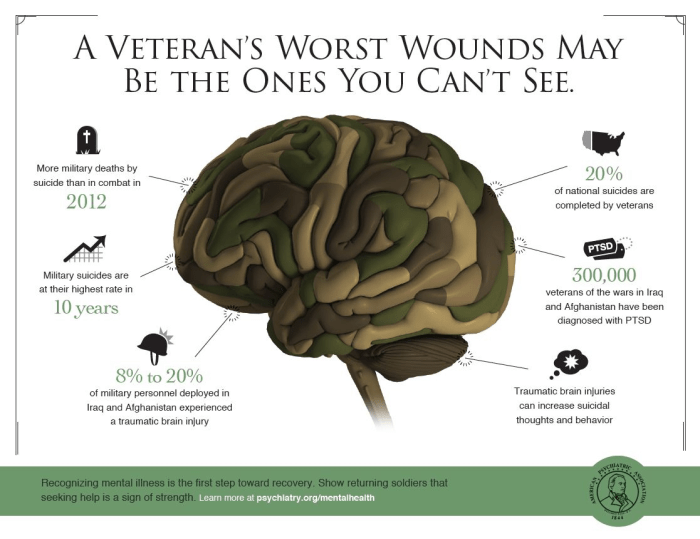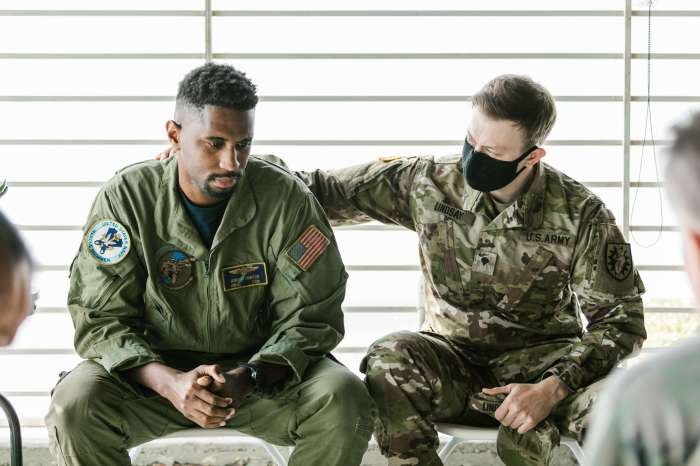Veterans Administration mental health takes center stage as we explore the critical role of the VA in providing essential support to those who have served our nation. The VA’s mental health services are a lifeline for veterans facing the unique challenges of transition back to civilian life, combat experiences, and the lasting impact of military service.
From counseling and therapy to medication management and support groups, the VA offers a comprehensive range of programs designed to address the diverse mental health needs of veterans. Recognizing the prevalence of conditions like PTSD, depression, anxiety, and substance abuse among veterans, the VA is dedicated to promoting mental health awareness, reducing stigma, and ensuring access to quality care.
Overview of Veterans Administration Mental Health Services

The Veterans Administration (VA) plays a crucial role in providing comprehensive mental health care to veterans who have served our country. The VA’s mental health services are designed to address the unique challenges faced by veterans, including post-traumatic stress disorder (PTSD), depression, anxiety, and substance abuse.
History and Mission
The VA’s commitment to veterans’ mental health dates back to the Civil War. The National Home for Disabled Volunteer Soldiers, established in 1866, was the first federal institution dedicated to providing care for veterans. The VA’s mission has evolved over time, but its core focus remains the same: to provide veterans with the highest quality of care, including mental health services.
Key Programs
The VA offers a wide range of mental health programs to meet the diverse needs of veterans. Some of the key programs include:
- Mental Health Treatment: The VA provides a variety of treatments, including individual therapy, group therapy, medication management, and intensive outpatient programs.
- PTSD Treatment: The VA has specialized programs for veterans with PTSD, including trauma-focused cognitive-behavioral therapy (TF-CBT) and prolonged exposure therapy (PE).
- Substance Abuse Treatment: The VA offers comprehensive substance abuse treatment programs, including detoxification, residential treatment, and outpatient therapy.
- Mental Health Prevention: The VA also focuses on mental health prevention through programs that promote mental well-being, such as stress management workshops and peer support groups.
Addressing Unique Needs
Veterans often face unique mental health challenges due to their experiences in the military. These challenges may include:
- Combat Stress: Combat exposure can lead to PTSD, anxiety, and depression.
- Military Culture: The military culture can contribute to mental health issues, such as difficulty adjusting to civilian life and feelings of isolation.
- Physical Injuries: Physical injuries sustained in the military can lead to chronic pain and disability, which can contribute to mental health problems.
The VA’s mental health services are designed to address these unique needs by providing specialized treatment and support.
Types of Mental Health Services
The VA offers a wide range of mental health services, including:
- Counseling: Individual and group counseling provides a safe and confidential space for veterans to discuss their experiences and develop coping skills.
- Therapy: The VA offers a variety of therapies, such as cognitive-behavioral therapy (CBT), dialectical behavior therapy (DBT), and psychodynamic therapy.
- Medication Management: The VA provides medication management for veterans with mental health conditions, such as depression, anxiety, and PTSD.
- Support Groups: Support groups provide a forum for veterans to connect with others who have shared experiences and offer mutual support.
Mental Health Challenges Faced by Veterans

The transition from military service to civilian life can be challenging for many veterans, often leading to a range of mental health issues. While not all veterans experience these difficulties, the prevalence of mental health conditions among this population is significant, with a notable impact on their well-being and overall quality of life.
Prevalence and Types of Mental Health Conditions
The mental health challenges faced by veterans are multifaceted and often linked to their unique experiences during and after military service. The most common mental health conditions diagnosed in veterans include:
- Post-Traumatic Stress Disorder (PTSD):This disorder is characterized by intrusive memories, nightmares, avoidance behaviors, and hyperarousal following a traumatic event. Combat exposure is a major risk factor for PTSD, with an estimated 11-20% of veterans experiencing this condition.
- Depression:A pervasive feeling of sadness, hopelessness, and loss of interest in activities that once brought joy. Depression can be triggered by a variety of factors, including combat stress, adjustment difficulties, and social isolation.
- Anxiety Disorders:Characterized by excessive worry, fear, and nervousness. Veterans may experience generalized anxiety disorder, panic disorder, or social anxiety disorder.
- Substance Abuse:The use of alcohol or drugs to cope with stress or trauma. Veterans may struggle with addiction to substances such as alcohol, opioids, or marijuana.
Factors Contributing to Mental Health Challenges
Several factors contribute to the increased risk of mental health conditions among veterans:
- Combat Experiences:Exposure to traumatic events, such as combat, can significantly increase the risk of PTSD, depression, and anxiety. The constant threat of danger, witnessing violence, and experiencing loss can have a profound impact on mental health.
- Military Culture:The military culture often emphasizes stoicism and suppressing emotions, which can make it difficult for veterans to seek help when they need it. There is also a stigma associated with mental health issues in the military, which can discourage veterans from seeking treatment.
- Transition Back to Civilian Life:The transition from military service to civilian life can be a stressful and isolating experience. Veterans may face challenges finding employment, adjusting to a new lifestyle, and reintegrating into their families and communities.
Impact of Mental Health Issues on Veterans’ Lives
Mental health issues can have a profound impact on veterans’ lives, affecting their relationships, employment, and overall well-being.
“The invisible wounds of war can be just as debilitating as physical injuries.”
National Center for PTSD
- Relationship Problems:Mental health conditions can strain relationships with family, friends, and romantic partners. Veterans may struggle to communicate their experiences and emotions, leading to misunderstandings and conflict.
- Employment Challenges:Mental health issues can make it difficult for veterans to find and maintain employment. They may experience difficulty concentrating, managing stress, or interacting with colleagues.
- Social Isolation:Veterans may feel isolated and disconnected from their communities after returning home. They may struggle to relate to people who have not experienced similar challenges, leading to feelings of loneliness and despair.
VA Mental Health Programs and Initiatives

The VA has implemented numerous programs and initiatives to address the mental health needs of veterans. These programs aim to provide comprehensive care, promote mental health awareness, and reduce stigma associated with seeking help.
PTSD Treatment Program
The VA’s PTSD Treatment Program provides specialized care for veterans diagnosed with post-traumatic stress disorder. This program offers a variety of treatment options, including individual and group therapy, medication, and exposure therapy. The goal is to help veterans manage their symptoms, cope with the effects of trauma, and improve their overall quality of life.
Eligibility for this program is based on a diagnosis of PTSD and enrollment in the VA healthcare system.
Mental Health Intensive Care Program
The Mental Health Intensive Care Program (MHICP) provides intensive care for veterans experiencing severe mental health challenges, including suicidal ideation, self-harm, and psychosis. This program offers 24/7 support and care, including individual therapy, group therapy, medication management, and crisis intervention.
MHICP is designed to stabilize veterans’ mental health and prevent further deterioration. Eligibility for this program is determined based on a comprehensive assessment of the veteran’s mental health needs and the severity of their symptoms.
Suicide Prevention Program
The VA’s Suicide Prevention Program is committed to preventing suicide among veterans. This program offers a range of services, including suicide prevention training for staff, outreach and support programs for veterans at risk, and a national suicide prevention hotline. The program aims to identify veterans at risk of suicide, provide them with the necessary support, and connect them with appropriate resources.
Eligibility for this program is based on a veteran’s self-reported risk factors or a referral from a healthcare provider.
Improving Access to Care
The VA is actively working to improve access to mental health care for veterans. This includes expanding access to telehealth services, increasing the number of mental health providers, and reducing wait times for appointments. The VA has also implemented initiatives to make mental health care more accessible to veterans in rural areas.
Reducing Stigma, Veterans administration mental health
The VA is committed to reducing stigma associated with mental health among veterans. This includes promoting mental health awareness through public campaigns, providing training for staff on mental health issues, and encouraging veterans to seek help when they need it.
Promoting Mental Health Awareness
The VA is actively promoting mental health awareness among veterans through a variety of initiatives. These include public education campaigns, partnerships with community organizations, and the development of resources and materials on mental health issues. The VA is also working to integrate mental health into primary care services to encourage early detection and intervention.
Challenges and Opportunities in VA Mental Health: Veterans Administration Mental Health

Providing effective mental health care to veterans is a complex and challenging endeavor. The VA faces numerous obstacles in its mission to meet the diverse needs of this population. However, emerging trends and innovative approaches offer promising opportunities to enhance the quality and accessibility of mental health services for veterans.
Challenges in VA Mental Health Care
The VA confronts several challenges in delivering comprehensive mental health care to veterans. These challenges stem from a combination of factors, including:
- Staffing Shortages: The VA faces a persistent shortage of mental health professionals, particularly in rural areas and specialty areas like PTSD treatment. This shortage can lead to longer wait times for appointments, limited access to specialized care, and increased workload for existing staff, potentially impacting the quality of care.
- Funding Constraints: Budgetary limitations can restrict the VA’s ability to expand its mental health services, hire additional staff, and implement innovative programs. This can hinder the agency’s efforts to address the growing mental health needs of veterans, particularly those with complex or chronic conditions.
- Bureaucratic Hurdles: Navigating the VA system can be challenging for veterans, particularly those with mental health conditions. Complex procedures, paperwork requirements, and long wait times can create barriers to accessing care, leading to frustration and delays in treatment.
Opportunities in VA Mental Health Care
Despite the challenges, the VA is actively exploring and implementing innovative approaches to improve mental health care for veterans. These opportunities are driven by technological advancements, evolving care models, and a growing understanding of mental health needs:
- Telehealth: Telehealth offers a promising solution to address geographic barriers and staffing shortages. Veterans can access mental health services remotely through video conferencing and other technologies, increasing accessibility and reducing travel time and costs. For example, the VA’s “Virtual Care” program offers a wide range of telehealth services, including therapy, medication management, and crisis intervention.
- Integrated Care Models: Integrating mental health care into primary care settings allows for early identification and intervention, improving access and reducing stigma. The VA’s “Patient-Centered Medical Home” model emphasizes a team-based approach to care, with mental health professionals working alongside primary care providers to address the whole person.
- Innovative Treatments: The VA is actively researching and implementing innovative treatments, such as mindfulness-based therapies, virtual reality exposure therapy, and pharmacogenetics, to enhance the effectiveness of mental health care. These advancements offer personalized approaches to treatment, tailored to the unique needs of individual veterans.
Improving VA Mental Health Services
Several strategies can be implemented to enhance the VA’s mental health services and better meet the needs of veterans:
- Addressing Staffing Shortages: Increasing salaries and benefits for mental health professionals, offering loan repayment programs, and expanding training opportunities can attract and retain qualified staff. The VA can also explore partnerships with universities and community organizations to increase the pipeline of mental health professionals.
- Streamlining Bureaucracy: Simplifying paperwork requirements, implementing online portals for appointment scheduling, and reducing wait times can improve the veterans’ experience and enhance access to care. The VA can also consider using technology to automate administrative tasks, freeing up staff to focus on providing clinical care.
- Expanding Access to Telehealth: Investing in telehealth infrastructure and training staff to deliver virtual care can significantly expand access to mental health services, particularly for veterans in rural areas or with limited mobility. The VA can also explore partnerships with private telehealth providers to increase the availability of services.
The Veterans Administration provides vital mental health services for veterans facing a range of challenges, from post-traumatic stress disorder to depression. For those seeking a faith-based approach, resources like pine rest christian mental health offer specialized support and guidance rooted in spiritual values.
These faith-based programs can complement the broader mental health services offered by the VA, providing a holistic approach to healing and well-being.
- Promoting Integrated Care: Encouraging collaboration between mental health and primary care providers can improve early detection and intervention, reducing the impact of mental health conditions on overall health. The VA can also implement programs to train primary care providers in mental health screening and basic interventions.
- Investing in Research and Innovation: Continued investment in research and development can lead to the discovery of new treatments and technologies, improving the effectiveness and efficiency of mental health care. The VA can also explore partnerships with private companies and research institutions to accelerate innovation.
Impact of VA Mental Health Services

The VA’s commitment to providing mental health services has had a profound impact on the lives of veterans, leading to improved mental health outcomes, reduced disability, and increased social integration. These services are crucial for supporting veterans’ transition back to civilian life and ensuring their overall well-being.
Improved Mental Health Outcomes
The VA offers a wide range of mental health services, including therapy, medication management, and support groups. These services have been shown to significantly improve mental health outcomes for veterans. Studies have demonstrated that veterans who access VA mental health care experience reductions in symptoms of depression, anxiety, PTSD, and other mental health conditions.
The Veterans Administration (VA) provides essential mental health services to veterans, recognizing the unique challenges they face. For those in the Bedford-Stuyvesant area, the Bedford Stuyvesant Family Health Center offers a comprehensive range of healthcare services, including mental health support, which can complement the VA’s offerings and provide a wider network of care for veterans in the community.
Additionally, veterans who engage in VA mental health services are less likely to experience suicidal thoughts or attempt suicide.
Reduced Disability
Mental health conditions can significantly impact a veteran’s ability to work and participate in daily life. VA mental health services play a crucial role in reducing disability by helping veterans manage their symptoms and improve their overall functioning. By providing timely and effective treatment, the VA can help veterans regain their independence and reduce their reliance on disability benefits.
Increased Social Integration
Mental health conditions can often lead to social isolation and difficulty connecting with others. VA mental health services can help veterans overcome these challenges by providing support groups, social skills training, and other resources that promote social integration. These services can help veterans build meaningful relationships, participate in their communities, and feel a sense of belonging.
Success Stories and Testimonials
“I was struggling with PTSD after my deployment. I was having nightmares, flashbacks, and difficulty concentrating. I was hesitant to seek help, but I finally reached out to the VA. The therapy and support groups I received helped me tremendously. I now feel like I have the tools I need to manage my PTSD and live a fulfilling life.”
John, a veteran who received VA mental health care.
“After my service, I was diagnosed with depression. I was unable to hold down a job and felt hopeless. The VA helped me find a therapist and get the medication I needed. With their support, I was able to get back on my feet and find a career that I love.”
Sarah, a veteran who benefited from VA mental health services.
Economic and Societal Benefits
Providing effective mental health services to veterans has significant economic and societal benefits. When veterans are able to manage their mental health conditions, they are more likely to be employed, contribute to the economy, and live fulfilling lives. This reduces the strain on social services and improves the overall well-being of our communities.
The Veterans Administration is committed to providing mental health support to those who have served our country. While the focus is often on addressing trauma and PTSD, it’s important to remember that true beauty lies in self-care and finding ways to nurture our well-being.
This website offers valuable resources on cultivating a healthy lifestyle, which can be incredibly beneficial for veterans seeking to manage stress and improve their overall mental health.
Epilogue

The VA’s commitment to veterans’ mental health is a testament to the importance of acknowledging the sacrifices made by those who serve our country. By addressing the unique challenges faced by veterans, the VA empowers them to lead fulfilling lives and contributes to a society that values and supports its heroes.
As we continue to learn and adapt, the VA’s dedication to innovation and improvement will undoubtedly pave the way for even greater support and care for veterans in the years to come.
Commonly Asked Questions
What are the eligibility requirements for VA mental health services?
Eligibility for VA mental health services is determined based on your military service history and the nature of your mental health condition. Generally, veterans who have served on active duty for at least 90 days and have been discharged under conditions other than dishonorable are eligible.
How can I access VA mental health services?
You can access VA mental health services by contacting your local VA medical center or clinic. You can also schedule an appointment online through the VA’s website or by calling the VA’s toll-free number.
Are VA mental health services confidential?
Yes, all VA mental health services are confidential. Your medical records are protected under federal law and will not be shared without your consent.